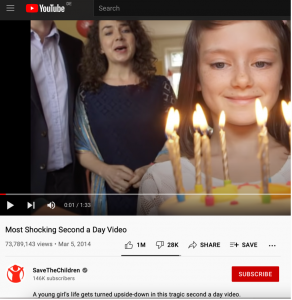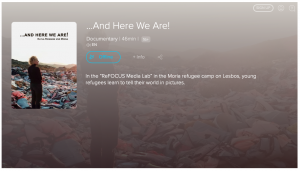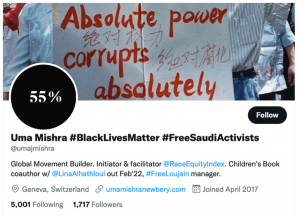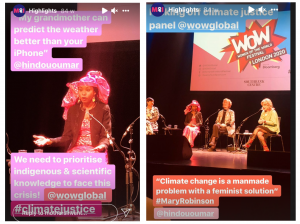What role does storytelling play in activism? How does impactful activism change the narrative?
Human Rights Film Festival Berlin took place on 16-25 September 2021 under the theme “The Art of Change”. Its programme included forty documentaries from around the world on prevalent topics such as climate change crisis, gender equality and freedom of expression.
Successful storytelling
This blog post will address key messages selected from the “Storytelling & Activism” panel discussion held in frames of the Festival on 23 September. The panelists exchanged views on their successful and impactful storytelling projects and considered synergies between work of activists, film directors and artists.
Festival Director Anna Ramskogler-Witt moderated the discussion with the invited guests:
- Uma Mishra, human rights and women rights Campaigner.
- Katja Riemann, German Director and Actress, debuting in the Festival with her first film “… And Here We Are”.
- Markus Beeco, Secretary General of Amnesty International Germany.
- Martina Dase, Director of Media & Strategic Communications at Save the Children Germany, the Festival’s main partner. Festival’s film selection by Save the Children was “The Right to Change (Save The Children)” that presents three films about children and young people struggling with traumas of terror, war and displacement.
- Thimali Kodikara, NY based co-host of a feminist poscast on climate change Mothers of Invention.
- Adesua Okosun, Film Director from Nigeria, founder of Young Africa Media platform.
Compassion fatigue?
Traditional humanitarian organizations might speak about a compassion fatigue. A cause for it could be telling “the similar story again and again and always in similar manner”, according to Martina Dase from Save the Children. She claimed that no, compassion is still there but in order to attain it, stories need to be told in a novel way that is not about simply passing on a meaningful story. Stories need to be told in a different way: in a way that “they get under your skin”.

A viral YouTube video “Most Shocking Second a Day Video” by Save the Children, produced together with an advertising agency. It is about Syrian war that was transferred to the UK. In the video, a nine years old girl celebrates her birthday when suddenly a civil war breaks out in London. A shocking scenario in reversed locations – within first 5 days after its release in 2014 this video counted 21 million views (now at almost 74 million views).
Reaching broader audiences
Storytelling amplifies activism by bringing up stories that are different from general information that we hear in the news or that we come across in humanitarian reports. Humanitarian organizations, NGOs and activists should combine their efforts aiming for such different stories to reach people who are outside of the bubble of those working in or engaged with humanitarian issues.

A film by Katja Riemann “… And Here We Are” tells stories of young refugees from the Moria refugee camp on Lesbos who themselves document their life that is then reported by BBC, CNN, Al Jazeera etc.
Safeguarding the authentic voice
What role do emotions play in campaigning, where is the border when it is too much? The guiding principle in impactful activism is to depict the harsh reality, to speak about the complex context and to highlight the facts.
In activism, when portraying a story of someone whose voice has been silenced, it is important to always keep in mind their authentic voice, to ensure its representation and not to compromise it. The goal is to help people, who otherwise are not familiar with a story, connect to it.

Twitter account of the human rights campaiger by Uma Mishra.
Creating joint stories
According to panelist Markus Beeco, Secretary General of Amnesty International Germany, in the context of Human Rights Film Festival Berlin – directors, film makers and artists who are engaged in activism jointly tell “stories of what the world is, what it could be and what it should be”.
This cooperation makes it possible to covey “unspeakable, unimaginable” stories presenting them from an unusual, non-conventional angle, in a way that enables us all to better relate to them. Impactful storytelling is about motivating people to join in and to have a joint story, a joint narrative together with “those who are somewhere else”.
Bringing in new audiences
To gather and combine different points of view, at the same time the same issue can be looked at from a perspective of someone from the Global South and someone from the Global North. This way we can see how their approaches differ. In activism, this method helps to get people relate to an issue in new, unusual ways.
Standard narratives can be changed by taking a different perspective – for example, using humor when talking about development issues and social justice. Such approach also allows to widen audiences around certain topics.

Mothers of Invention: feminist climate justice podcast on their @mothersinvent Instagram account.
Art and activism
All “Storytelling & Activism” panelists emphasized the significance of cooperation between artists, film directors and activists that is of utmost importance in helping to create impact and foster social change. Their cooperation brings up and highlights authentic everyday experiences by telling stories of those who otherwise are overlooked or simply ignored.
